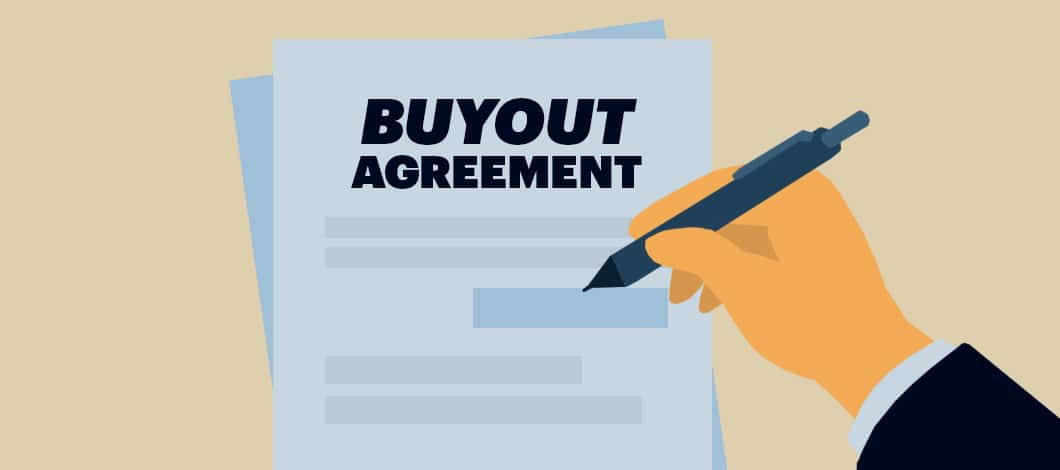Knowing how to buy out a business partner can help you gain control of your company without unnecessary hassle.
Here’s how to do it. We walk you through the process in 10 steps, starting with how to determine whether a buyout is the best way to proceed and covering what to do if you decide to go ahead with buying out a business partner.
1. Identify Your Goals
Before you begin the process of buying out a partner in a small business, consider what you hope to gain through a buyout.
Is your purpose to:
- Take over control from a partner who wants to move on willingly?
- Negotiate with a partner who hasn’t indicated a desire to leave?
- Restructure a business after one partner retires or dies?
- Get out of a bad partnership?
- Gain management control over the company’s direction to make it more profitable?
- Gain financial control over the company?
Considering these types of questions can help you determine whether a buyout is the best way to achieve your goals. It also can clarify your own interests and that of your partner, giving you a basis for negotiating.
2. Study Your Partnership Agreement
Your partnership agreement or articles of incorporation may have been written to include a buy-sell agreement stipulating how buyouts are to be handled.
Common types of agreements include:
- Cross-purchase agreements, where the remaining owners can buy the interest of a departing owner
- Redemption agreements, where the business entity buys the interest of a departing owner
- Combinations of cross-purchase and redemption agreements
Buy-sell agreements may contain provisions for how ownership of the company is to be handled if one partner leaves. For instance, an agreement may require that the existing owners be allowed to buy a partner’s shares before they can be sold to another party.
Additionally, agreements may stipulate matters such as how the value of a partner’s shares is to be assessed. Review your partnership agreement to determine whether any buy-sell agreements factor into your buyout process.

3. Review Your Options
Studying your partnership agreement can help you assess your buyout options. You may find buying out your partner isn’t your only option or even your best option.
For example, depending on how your partnership agreement was written, if you simply want to end your partnership without continuing the business, you may be able to dissolve your partnership without a buyout. This may simplify things and save you money.
Your agreement also may allow you to restructure ownership of your company without a buyout, or your partner may be open to rewriting your agreement.
If you find these aren’t options, a buyout may be the only route that allows you to gain control of the company. However, before settling on this, you first should ascertain whether this will be feasible and profitable. The following steps will help you with this determination.
4. Consult an Accountant
Whether buying out your business partner represents a viable option depends partly on the state of your company’s finances as well as your own personal finances. You need to know what your company is worth if you’re going to buy it out from your partners. You also need to know whether you can afford to buy it. Further, you’ll want to estimate your company’s future value so you can evaluate whether a buyout is worth it.
An accountant can help you make these determinations by reviewing your company’s financial statements and your personal finances. Consulting an accountant early in your buyout decision-making process can help you decide whether or not to pursue a buyout and can point you in the right direction should you choose to move forward.
5. Hire an Acquisitions Attorney
An acquisitions attorney can assist you with several aspects of your buyout process. They can help you review your partnership agreement and understand its implications. An attorney can assist you with evaluating your legal options and the strength of your bargaining position. They can advise and represent you in negotiations with your partners. They can help you draw up the language of your buyout agreement.
These services make hiring an acquisitions attorney essential if you decide to pursue a buyout. Consulting one early in the decision-making process can help you avoid missteps.
6. Negotiate with Your Partners
After gaining a sense of your options in consultation with your advisers, negotiating with your partners is the next step to move the buyout process forward. While partner cooperation isn’t essential for all buyouts, securing it can help make the entire process easier, win you a better buyout deal and keep you on friendly terms with your partners. This last consideration may be especially important when buying out a family business partner.
In a best-case scenario, you already have a partnership agreement that includes buy-sell provisions, putting you and your partner on the same page. If not, look at the situation from your partner’s viewpoint and try to present your buyout offer in terms that represent their best interests. For example, you might emphasize the money they stand to make.
7. Get a Business Valuation
To negotiate a price with your business associates, you’ll need to know how to value a business for partner buyout. Your buy-sell agreement may specify how the value of your partner’s interest is to be determined. In general, a best practice is to hire an independent valuation firm. A professional valuation considers factors such as your company’s income, the market value of similar companies and the fair market value of your company’s assets after liabilities are factored in.
A professional valuation can be expensive, so you may wish to hold off on this step until you’re reasonably sure a buyout is feasible. A business valuation typically costs $7,000 to more than $20,000 depending on its scope, according to wealth planning advisory firm Mariner Wealth Advisors.

8. Finance Your Buyout
After you’ve done a valuation, you’re in a position to determine how much you need to finance a buyout. Some buy-sell agreements include provisions where partners take out life insurance policies on each other to help finance buyouts in the event that one partner dies. In most situations, you will need additional forms of financing.
One option is applying for financing such as a small business loan. However, the buyout process doesn’t inject capital into your company, which can reduce your ability to repay loans, making some lenders reluctant to extend buyout loans.
A solution can be to negotiate a payment arrangement with your partner. Effectively, this puts your partner in the role of financial provider, allowing you to repay what you owe them over time.
9. Make a Buyout Offer
When you’ve got a valuation and the financing to cover the cost, it’s time to make a formal buyout offer. A buyout proposal should cover both the price of your offer and the non-financial aspects of your arrangement. For example, if one partner is leaving your company, are they obliged to adhere to any nondisclosure agreements regarding intellectual property?
Your attorney can help you draw up a formal offer for buying out a partner. If you already have a buy-sell agreement, it can serve as a basis for developing an offer. If not, your attorney can draw up a buy-sell agreement for your offer.
10. Complete Your Buyout Paperwork
Once you’ve reached an agreement for buying out partnership interest, the final step is to complete all paperwork to activate the buyout. This includes filing all relevant forms with federal, state and local officials. For instance, you’ll need to update your business ownership information.
Partners leaving the company should have their names removed from company accounts and should be released from company liability. Your attorney can assist with completing this part of the process.
Follow Buyout Best Practices for a Smooth Acquisition Process
The path to buying out a business partner begins with identifying your motives for wanting to acquire your company, which can help you determine the best way to proceed. A review of your partnership agreement in consultation with an accountant and attorney can help you evaluate whether a buyout is the best way to achieve your goals.
Say that you do decide to go ahead with a buyout. You’ll need to:
- Talk with your partners
- Get a business valuation
- Find financing for your buyout
- Draw up a buyout agreement
Filling out the required paperwork puts the cap on a successful buyout process.
Note that if you need additional financing to follow through with your buyout plans, Fast Capital 360 can help you find and compare loan offers and other financing arrangements. Take a few minutes to fill out our free, no-obligation prequalifying application and find out what types of financing resources may be available to support your buyout plans.










